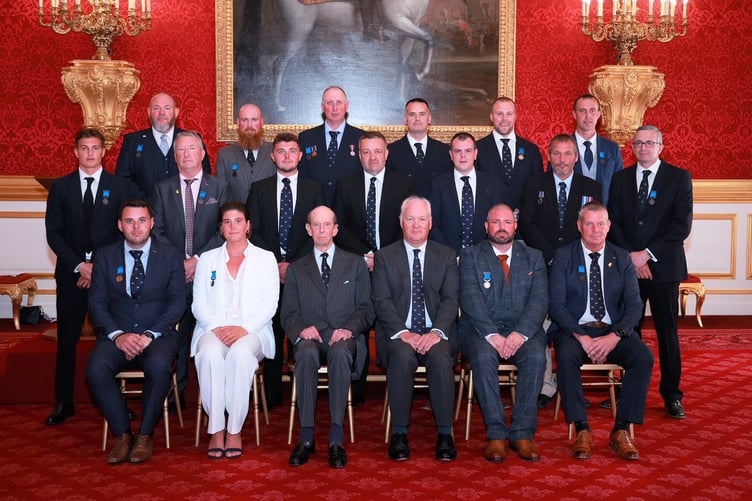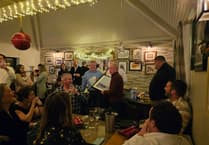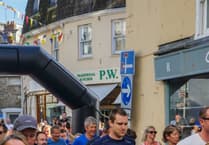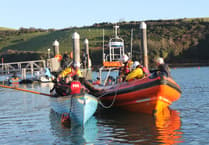Iain Dundas has spent 15 years helping others as part of Salcombe lifeboat crew now he needs some help from the public.
A few weeks ago, he was given nine months to live.
He has a large, malignant brain tumour. Smaller tumours can be treated with surgery, chemotherapy or radiotherapy.
But, for a large tumour like Iain’s, there is no treatment available on the NHS.
“I felt I was told to go home and die quietly.
"But I’m not ready to die yet,” Iain said.
As a lifeboatman, Iain never gave up when it came to saving others. Now, with the support of his partner Natalie, he won’t give up on saving himself either.
The couple began to research Iain’s tumour straight away, and have found a treatment that could give him years more to live, rather than months.
The Optune device could shrink the type of brain tumour that’s killing Iain, to the point where it’s small enough for other treatments to work. But it’s only available privately in the UK, and at a prohibitive cost of £17,500 a month.
Tara Rezaei who set up the campaign said: "We’re aiming to raise £105,000, to fund six months of Optune treatment.
"The next stage would be a CEGAT vaccine to kill the tumour, which costs another £50,000."
Iain was awarded a rare RNLI Medal for Gallantry for rescuing two people from a grounded yacht in a raging gale in December 2020.
The yacht was in danger of breaking up, stranded on a rocky outcrop in a tight gully.
The Coastguard helicopter couldn’t help – conditions were too wild. It was 4.30am, and Salcombe lifeboat couldn’t get close enough to help either – the gully was too shallow, the rocks too jagged, the cliffs too close.
But the volunteers refused to leave the terrified sailors to their fate.
Salcombe lifeboat carries a small inflatable dinghy onboard, and there was a chance to reach them that way.
But it was dangerous; In pitch black, big swells and driving rain, it wasn’t an easy job.
And if anything was to go wrong in that gully, the crews on the larger lifeboat and in the helicopter would not have been able to help.
Still, two RNLI crew volunteered to take the risk, it not being in their nature to leave people alone at sea, one of those men was Iain Dundas.
With skill, courage, training, determination – and luck, the crew on the small inflatable managed to get to the yacht, grab the two sailors, and bring them safely back to the lifeboat.
Iain put himself in danger that night to save others. But now, his luck is running out, and it’s him who needs saving.

Just weeks before this tumour was diagnosed, Iain got engaged to Natalie. They’re true soulmates, with a large family of rescue animals between them, and a love of crafts.
They found each other later in life, and this should have been a time of such joy.
Iain is a dad to three boys from his first marriage: 22-year-old twins Nathan and Isaac, and 18-year-old Angus. Nathan is a medic with the Navy, and has been a real support with his knowledge of healthcare.
Isaac is away in London studying law. It’s been hard to be far from the family in this difficult time, but he came home for Christmas and for his dad’s birthday. Angus is just finishing his apprenticeship in butchery.
All three boys keep Iain smiling – they go to the cinema, play crazy golf, and enjoy the odd Nando’s.
All four Dundas boys have dreamed for years of seeing the Great Wall of China together.
But these days, Iain’s dream is a simple one: to be able to watch his sons grow up, and to one day be a grandad.
Iain worked as an HGV driver until his condition meant that he could no longer do so safely. He’ll probably never be able to drive for a living again.
He’ll be happy with whatever job pays the bills once he’s on the road to recovery.
With this treatment, Iain has a chance at a simple, peaceful life with his boys, his wife, his animals and his hobbies. He might never be on the lifeboat crew again, but will continue to support his fellow lifesavers however he can.
As a lifeboat crew member, Iain spent years helping others. There are people alive today who would not have survived without him.
Much like at sea, there are no guarantees with the Optune device and the CEGAT vaccine, but other patients (who could afford this private treatment) were given years more to live.
If you would like to help you can visit https://tinyurl.com/yck3fzwm





Comments
This article has no comments yet. Be the first to leave a comment.